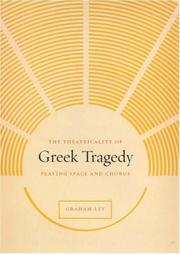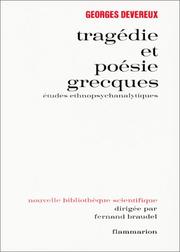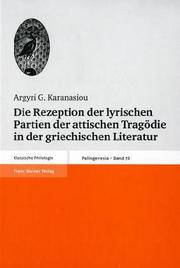Book
ISBN: 2012787754 9782012787759 Year: 1996 Publisher: Paris: Hachette,
Abstract | Keywords | Export | Availability | Bookmark
 Loading...
Loading...Choose an application
- Reference Manager
- EndNote
- RefWorks (Direct export to RefWorks)
Book
ISBN: 9781108706094 1108706096 Year: 2019 Volume: 44 Publisher: Cambridge : Cambridge University Press : Published for the Classical Association,
Abstract | Keywords | Export | Availability | Bookmark
 Loading...
Loading...Choose an application
- Reference Manager
- EndNote
- RefWorks (Direct export to RefWorks)
First produced in Athens during the fifth century BC, the tragedies of Sophocles are a high point in world literature, vividly depicting unforgettable characters confronted with emotional crises, moral dilemmas, and the inscrutable ways of the gods. This volume examines Sophocles' reputation as a dramatic poet both in his own day and later in antiquity, considering how it was that some of his plays survived from his time to ours. It investigates the qualities of those plays, focusing on key aspects of Sophoclean dramaturgy such as stagecraft, narrative, rhetoric, and heroism. And it incorporates within its discussion not just the seven plays that survive in full, but those major fragments discovered in recent years which shed so much light on Sophocles' extraordinary ability as a poet and a dramatist. All Greek is translated, making this volume accessible to anyone with an interest in one of the greatest playwrights of all time.

ISBN: 9780226477572 0226477576 0226477584 9786612646393 0226477568 1282646397 9780226477565 9781282646391 661264639X Year: 2007 Publisher: Chicago University of Chicago Press
Abstract | Keywords | Export | Availability | Bookmark
 Loading...
Loading...Choose an application
- Reference Manager
- EndNote
- RefWorks (Direct export to RefWorks)
Ancient Greek tragedy has been an inspiration to Western culture, but the way it was first performed has long remained in question. In 'The Theatricality of Greek Tragedy', Graham Ley provides an illuminating discussion of key issues relating to the use of the playing space and the nature of the chorus, offering a distinctive impression of the performance of Greek tragedy in the fifth century BCE. Drawing on evidence from the surviving texts of tragedies by Aeschylus, Sophocles, and Euripides, Ley explains how scenes with actors were played in the open ground of the orchestra, often considered as exclusively the dancing place of the chorus. In reviewing what is known of the music and dance of Greek antiquity, Ley goes on to show that in the original productions the experience of the chorus& expressed in song and dance and in interaction with the characters& remained a vital characteristic in the performance of tragedy. Combining detailed analysis with broader reflections about the nature of ancient Greek tragedy as an art form, this volume& supplemented with a series of illustrative drawings and diagrams& will be a necessary addition to the bookshelf of anyone interested in literature, theater, or classical studies.
Drama --- Greek drama (Tragedy) --- Theater --- Technique. --- History and criticism. --- History --- Drama - Technique. --- Drama -- Technique. --- Greek drama (Tragedy) - History and criticism. --- Greek drama (Tragedy) -- History and criticism. --- heater -- Greece -- History -- To 500. --- Theater - Greece - History - To 500. --- Languages & Literatures --- Greek & Latin Languages & Literatures --- History and criticism --- Technique
Book
ISSN: 08914087 ISBN: 9781433104541 1433104547 Year: 2009 Volume: 16 Publisher: New York, N.Y. Lang
Abstract | Keywords | Export | Availability | Bookmark
 Loading...
Loading...Choose an application
- Reference Manager
- EndNote
- RefWorks (Direct export to RefWorks)
Thematology --- Classical Greek literature --- Drama --- Greek drama (Tragedy) --- Justice in literature --- History and criticism --- Athena --- In literature --- Athens (Greece) --- Greek drama (Tragedy) - History and criticism --- Athena - (Greek deity) - In literature --- Athens (Greece) - In literature --- Athena - (Greek deity)
Book
ISBN: 9780199577842 0199577846 0191722626 9786612698323 0191573647 128269832X Year: 2010 Volume: *51 Publisher: Oxford Oxford University Press
Abstract | Keywords | Export | Availability | Bookmark
 Loading...
Loading...Choose an application
- Reference Manager
- EndNote
- RefWorks (Direct export to RefWorks)
Poetry --- Classical Greek literature --- Drama --- Greek drama (Tragedy) --- Chorus (Greek drama) --- History and criticism --- History and criticism. --- Chorus (Greek drama). --- Drama - Chorus (Greek drama) --- Greek drama (Tragedy) - History and criticism
Book
ISBN: 9782707322012 2707322016 Year: 2012 Volume: *15 Publisher: Paris Minuit
Abstract | Keywords | Export | Availability | Bookmark
 Loading...
Loading...Choose an application
- Reference Manager
- EndNote
- RefWorks (Direct export to RefWorks)
Il faut sauver la tragédie grecque de toute la gnose philosophique et tragique qui l'accable depuis près de trois siècles. Il faut la sauver de notre conception moderne de la littérature et du théâtre. Il faut la sauver de nous-mêmes pour la retrouver ailleurs, très loin, dans les lieux les plus improbables : le nô japonais, la messe catholique, la psychanalyse freudienne... A moins qu'elle ne soit déjà plus nulle part. Car la tragédie est aussi introuvable que le tombeau d'Œdipe, ce tombeau que Sophocle prit pour thème de sa pièce ultime, laquelle est également la dernière tragédie grecque connue. Avec Oedipe à Colone pour fil conducteur, ce livre raconte l'histoire édifiante d'une incompréhension à laquelle nous sommes voués. Il révèle les incroyables trahisons et mutilations dont ces chefs-d'œuvre furent les victimes et propose en retour quelques thèses - ou hérésies - susceptibles de bouleverser non seulement notre vision de la tragédie, mais notre conception même de la littérature et de ses pouvoirs - sur les lieux, les corps et les dieux. Nul détour n'est aujourd'hui si troublant ni si salutaire.
Philosophy --- Medieval Greek literature --- Greek drama (Tragedy) --- Tragédie grecque --- History and criticism. --- Histoire et critique --- Sophocles. --- History and criticism --- Classical Greek tragedy --- Criticism --- Criticism. --- Tragédie grecque --- Greek drama (Tragedy) - History and criticism
Book
ISBN: 2707107727 9782707107725 Year: 1975 Publisher: Paris Maspero
Abstract | Keywords | Export | Availability | Bookmark
 Loading...
Loading...Choose an application
- Reference Manager
- EndNote
- RefWorks (Direct export to RefWorks)
Theatrical science --- Antiquity --- Greece --- Theater --- Greek drama (Tragedy) --- History --- History and criticism --- Theater - Greece - History - To 500 --- Greek drama (Tragedy) - History and criticism --- Theater - Greece --- Théâtre --- Theater. --- Greek drama --- History and criticism. --- Greece. --- Athènes, 5e s. av. J.C.

ISBN: 2082106454 9782082106450 Year: 1975 Publisher: Paris Flammarion
Abstract | Keywords | Export | Availability | Bookmark
 Loading...
Loading...Choose an application
- Reference Manager
- EndNote
- RefWorks (Direct export to RefWorks)
Poetry --- Drama --- Classical Greek literature --- Depth psychology --- Greek poetry --- Greek drama (Tragedy) --- Psychoanalysis and literature --- Ethnopsychology --- History and criticism --- Dieptepsychologie. --- Drama. --- Klassieke Griekse letterkunde. --- Poezie. --- Greek poetry - History and criticism --- Greek drama (Tragedy) - History and criticism
Book
ISBN: 0416763200 9780416763201 Year: 1978 Publisher: London
Abstract | Keywords | Export | Availability | Bookmark
 Loading...
Loading...Choose an application
- Reference Manager
- EndNote
- RefWorks (Direct export to RefWorks)
Classical Greek language --- Classical Greek literature --- Theatrical science --- Drama --- Antiquity --- Greek drama (Tragedy) --- Theater --- History and criticism --- History --- Greek drama (Tragedy) - History and criticism --- Theater - History - To 500 --- Theater - Greece

ISBN: 3515082271 9783515082273 Year: 2002 Volume: 78 Publisher: Stuttgart Steiner
Abstract | Keywords | Export | Availability | Bookmark
 Loading...
Loading...Choose an application
- Reference Manager
- EndNote
- RefWorks (Direct export to RefWorks)
Greek drama (Tragedy) --- Greek poetry --- Lyric poetry --- History and criticism. --- History and criticism --- Greek drama (Tragedy) - History and criticism. --- Greek poetry - History and criticism. --- Lyric poetry - History and criticism. --- Greek poetry - History and criticism --- Lyric poetry - History and criticism

 Search
Search Feedback
Feedback About UniCat
About UniCat  Help
Help News
News